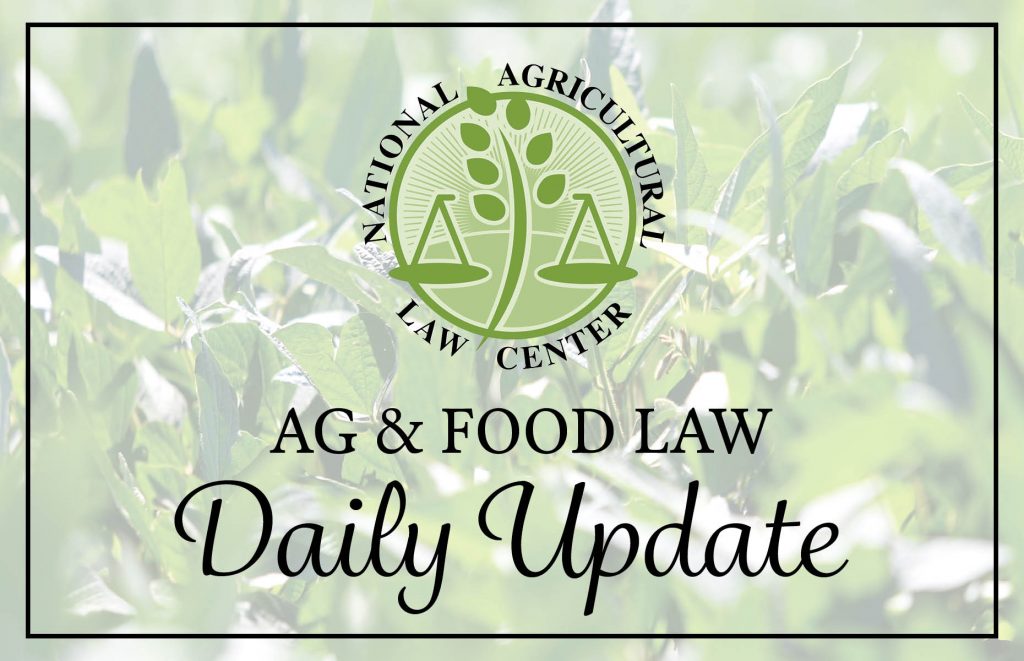A comprehensive summary of today’s judicial, legislative, and regulatory developments in agriculture and food. Email important additions HERE.
JUDICIAL: Includes NFMA, grazing allotments
In Oregon Nat. Desert Ass’n v. U.S. Forest Serv., No. 18-35514, 2020 WL 2091108 (9th Cir. May 1, 2020), the court considered a challenge to the United States Forest Service’s (“Forest Service”) issuance of grazing authorization on seven allotments in the Malheur National Forest (“MNF”) between 2006 and 2015. The plaintiffs argued that the Forest Service violated the National Forest Management Act (“NFMA”) by failing to “analyze and show” that the grazing authorizations were consistent with the MNF Land and Resource Management Plan (“Forest Plan”). Specifically, the plaintiffs argued that the grazing authorizations were unlawful because the Forest Service had failed to show that the authorizations were consistent with two Forest Plan Standards: the Inland Native Fish Strategy (“INFISH”), and Forest Plan Management Area 3A Standard 5 (“Standard 5”). Both standards involved the management of fish habitats. The NFMA provides for the creation of forest plans which are recognized as an important tool in helping the Forest Service manage national forests. The NFMA directs the Forest Service to create forest plans that provide for multiple uses of national forests, including outdoor recreation, range, timber, watershed, wildlife, and wilderness uses. Additionally, the NFMA requires that “permits . . . for the use and occupancy of National Forest System Lands shall be consistent with the [forest] plans.” The Forest Plan, which governs the management of the MNF, was adopted in 1990.
The plaintiffs argued that the NFMA’s requirement that all permits issued by the Forest Service must be consistent with the applicable forest plan required the Forest Service to “analyze and show that each grazing decision it makes is consistent with the Forest Plan in a contemporaneous written document.” However, the court concluded that the Forest Service was not required to produce such a document because the NFMA did not mandate that they do so. Additionally, the court noted that in prior cases, the court had concluded that they could not add procedural requirements into the NFMA that were not already there. After dismissing the plaintiffs’ procedural argument, the court turned to the plaintiffs’ substantive argument that the grazing permits were not consistent with the standards in the Forest Plan. In reviewing whether the grazing permits were consistent with the Forest Plan, the court noted that it had to consider whether the Forest Service’s actions reflected a “clear error in judgement.” If not, then the court would defer to the Forest Service’s expertise. After reviewing the administrative record, the court concluded that the Forest Service had not made a clear error in judgement by issuing the grazing permits. Therefore the court ruled in favor of the Forest Service.
REGULATORY: Includes EPA, NOAA
ENVIRONMENTAL PROTECTION AGENCY
Proposed rule implementing significant new use rules under the Toxic Substances Control Act for chemical substances that were the subject of premanufacture notices and are subject to Orders issued by EPA pursuant TSCA. Info here
NATIONAL OCEANIC AND ATMOSPHERIC ADMINISTRATION
Temporary rule determining that the Atlantic bluefin tuna daily retention limit that applies to vessels permitted in the Highly Migratory Species Angling category and the Charter/Headboat category should be adjusted for the remainder of 2020, based on consideration of the regulatory determination criteria regarding inseason adjustments. Info here.
